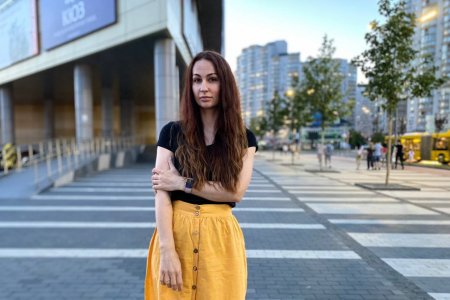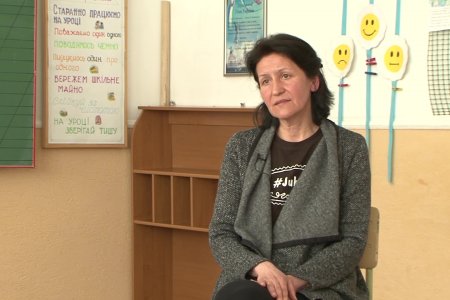
I am Kyrylo Kutsenko, from Rubizhne, a city in the Luhansk Region. I arrived at the Groedel community centre in West Ukraine (Skole town, Lviv Region) over two months ago.
I left Rubizhne because of the bombing: first our house was destroyed, then my grandmother’s, and it became impossible to live there – without light, water, gas or food. Everyone left when they could, even under bombardment.
Could you sense the approach of the war that broke out on 24 February?
We followed the news, and around two weeks before the start of the war our tanks moved into Varvarivka, a neighbouring village. Something is bound to happen soon, I told everyone:no one believed me. Things started in Rubizhne around the fifth or sixth day of the war [in early March]. The Russians occupied Varvarivka and then started to move towards Rubizhne.
I lived in the city’s sixth micro-district, not far from Varvarivka. On 7 March at 11 am a shell hit my flat. My girl-friend, my mother, my sister and I made it down to the basement. As soon as we moved downstairs something else hit the building. Half an hour later it was all over. I went upstairs, opened the door and saw that everything looked as if it had been turned inside out. There were two holes in the balcony. Another building nearby received a direct hit to the fourth floor. Many people died there; some were buried alive or injured.
The rescuers arrived; the basement had collapsed, I heard. People were dug out. The next morning, we left for our grandmother’s: she shares a private house with three other owners. I stayed there with my grandmother, my mother and her friend, my sister and my grandfather; there was a 91-year-old neighbour in the next room. The Red Cross could not bring her food and water, but she had gas. As long as she had gas we cooked and shared our food.
Sometime around 17 or 18 March (I can’t remember the exact date) the entire street was shelled. There was a college nearby and our guys from the Armed Forces were the target. There was anew Post Office and a bomb shelter; ordinary people were hiding there but no soldiers. Russian troops shelled our district, the Armed Forces and the new Post Office. Later our guys retreated,and Russian troops demolished the entire neighbourhood.
The Russians saw there was nobody around but still they levelled all the buildings to the ground. They began with next-door’s yard: the roof caught fire, the house burned down, and we grabbed what we could and took it outside. Our neighbours had a car. They weren’t there at the time; we were barely able to start the car and drive it away under fire. We returned later, but there wasn’t even a yard left.
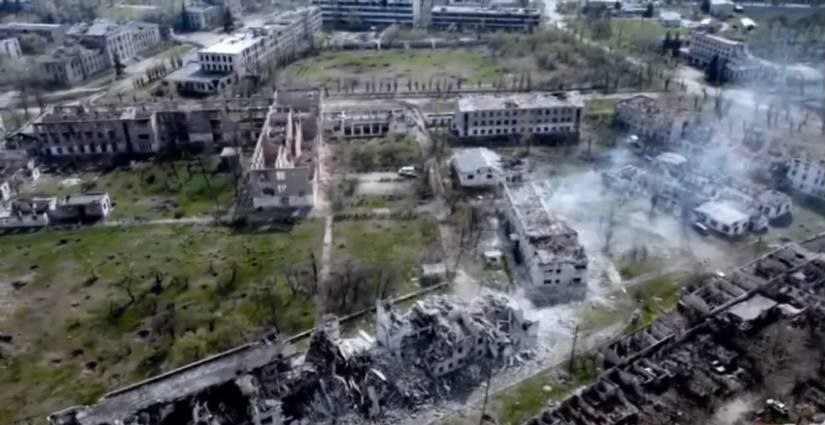
How did the fighting go in Rubizhne?
Our guys were on one side, the Russian troops on the other, and we were in the middle. Our guys defended the city for a long time, although for almost two months we were surrounded on the outskirts of the city. There wasn’t even room to fight there, just waste ground, and the shelling was heavy. When we got to the community centre in Pivdenne village, there was supposed to be a green (evacuation) corridor there. People were assembling and the Russiansbegan firing at the corridor, although agreement had been reached on evacuation. They hit one side of the community centre, but nobody was injured…
Did you see the destruction of civilian sites?
All the buildings on our street were destroyed –52 Berestova Street (where my grandmother lived) and almost every other building there. They were all hot because the shelling was repeated several times. Our grandmother’s house survived for a long while. The building across the street had no roof and shells hit its yard twice. The first blow was weak, only the fence was damaged;the second impact shattered the windows and the roof. Almost the entire park and the area around it was destroyed. So was the New Post office where people tried to hide. The State Emergency Service arranged the charging of phones there while there was still a mobile signal; they installed generators, and we could get water there because it was scary to go too far.
On one occasion people were charging their phones there and getting water near the bus station when a shell landed and killed almost 20 of them. I don’t know what the Russians were aiming at, but they missed. The tank crew knew there were no soldiers around; they were just shooting at the buildings.
Do you know of other crimes against the civilian population committed by Russian soldiers?
An old woman lived on our street, and she often met our neighbour, Auntie Tasya. A shell hit her house, shattered the roof and she received a shrapnel wound in her arm. My grandfather brought her to the Emergency Services at the New Post office as the shells fell around to have her arm cleaned and bandaged: we only had boiled water from melted snow. They were giving out food at the New Post Office; there were many people there and many rooms. The Emergency Services even placed a television there and somehow found Ukrainian TV channels. I don’t know what magic they used to let us see at least some news, because there was no information about what was happening. For example, my uncle and his family still live on the outskirts of Mariupol. Their building is standing, and everything around is in ruins…
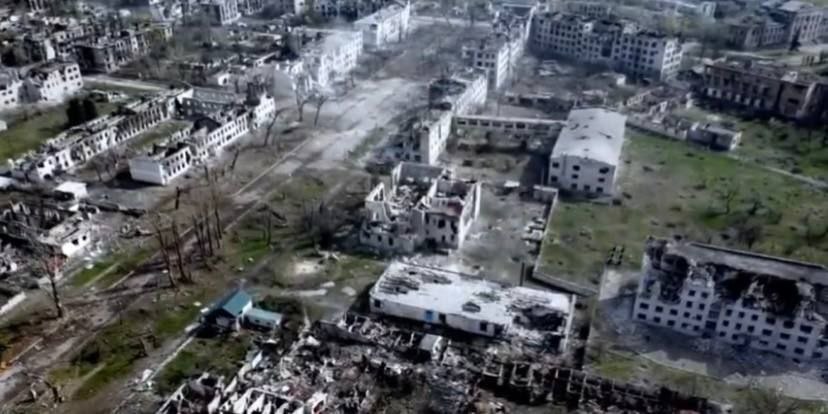
How did you find food during the occupation?
We got water from the New Post Office and ate what was left in the cellar, some pickled gherkins and tomatoes. Later, the city was bombed, and there was fighting in the city centre, near the bus station. The “Simya” (Family) store was gutted, and the food was lying around. We gathered some of it. And neighbours brought us things: they knew we had a little seven-year-old… They brought apples and other food. I exchanged cigarettes for flour to bake bread.Every day my mother cooked pancakes and soup outside. Then we learned that our neighbour still had gas. We used her kitchen to cook rather than cook outside when the bullets were flying overhead…
We ran to the city centre to search for food with mom’s friend, Oleksandr.We found some at our wrecked apartment, some at the neighbours.We went all round the city, around the park:it would have been faster to go across the park, but we knew our guys were there, and if they were shelled…They did come under fire, as well as the surrounding districts. A shell flew 10-15 metres from us. It took a moment to hide in the mechanics’ pit in a garage. Then we ran into a building to hide. Oleksandr never smoked before, but he began smoking now. We got home as the shells were falling.
Later food was scarce. We made soup from lard and some grain. Noodles, bones and skin that we used to give to the dogs– we didn’t have anything else.
How did you get out of the occupied territory?
We were already living in Pivdenne village, a part of Rubizhne. We received a message from a girl who reached West Ukraine much earlier.She left for Skole. There were green corridors almost every day. My grandfather and I packed our things… Some water, two apples, nothing else, only what we had with us… We didn’t take anything else, we received everything here.
Off my grandfather and I went, riding two bicycles. While I was waiting for the green corridor and the bus, my grandfather went to visit my great-aunt who lived nearby; the phone lines were dead, and we didn’t know which of our relatives were still alive. My grandpa went to my mom and my grandma. I went on alone.
I came to Lviv, then here to Skole. About three days later my great-aunt arrived. My mother and my sister, with her friend and his family and grandparents, were all moving to Dnipro.
Has anyone you knew remained in Rubizhne?
When we arrived here, I began calling my friends. Many of them had left, but others stayed in Rubizhne. There was a mobile signal at first but now the last tower had been destroyed. We used to be able to make a call in the field, but now we can’t get through.
My friend left; he’s in Kyiv with his mom. His stepfather joined them later. They didn’t know where he was. As far as I know, he was taken prisoner in Rubizhne and was beaten and interrogated.My other friend’s dad was killed when a piece of shrapnel hit his arm. They tried to leave for Russia, but they didn’t make it. Many friends left by going east throughRussia.They had no choice: without a home or food they had to leave. Some friends, miraculously, were able to leave for Ukraine.
I was closer to the Ukrainian side, but some left after the green corridor was closed, when the shelling intensified.It was already tough, but it grew worse, they said, and some shells hit chemical tanks. They exploded and there were clouds of smoke. They got to the Ukrainian side through the forests and the fields.
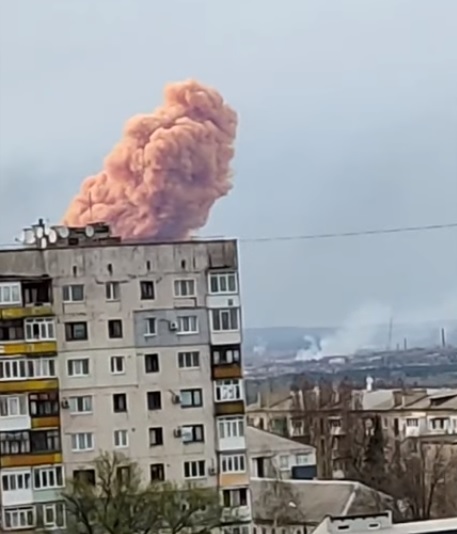
Were the events of 2014 different from this conflict?
In 2014, Russian troops wanted to take Rubizhne. They blew up the bridge across the Siverskiy Donets River and tried to attack from two sides, but our guys repelled them. In 2014 some buildings were damaged,a mortar shell went through the roof of my friend’s house but didn’t explode. It stuck there for three more months, until he went upstairs. He saw it and called the Emergency Services. Some people had their windows shattered then and I know some were killed in 2014, but it happened on the city outskirts.We were not occupied then, our soldiers protected us. We rebuilt the bridge in about a year, and there were checkpoints, but that’s it: other cities suffered greater damage.
Severodonetsk is the closest city to us. The Russians wanted to take it in 2014, but there was a chemical plant there and our side said they must not occupy it. They wanted to encircle us, but we had the “Zorya” plant, producing explosives for the construction industry. Our guys said if they hit it there will be a powerful explosion. This time the Russians were not deterred. They bombed the “Zorya” plant. It’s a good thing that almost everything had been removed. But there was still a powerful explosion when it was hit.
Did the Russian population of Rubizhne feel oppressed?
To be honest, in 2014 when Ukrainization began the Russian language was no longer taught in schools or was taught like a foreign language. There were no Russian classes, and there was still a threat: “You will be eaten by the ‘followers of Bandera’. We are part of Ukraine, but that Ukraine is not your friend”. They brainwashed us, there was the Ukrainization and they tried to prove that Russia is also good.
Almost everything in Rubizhne was in Russian – almost the entire Luhansk Region speaks Russian– and nobody did anything bad to us. When I arrived in Lviv, I spoke Russian from the beginning,and nobody took offence. I was accepted just fine, we were given food, clothes and a shelter. I spoke Russian when I began working here. What they say on the Russian news that “The Bandera followers eat everyone there”is nonsense. We live much better than we used to, because the people here are kind, they help us...
Translation, Vitaly Konkin and John Crowfoot

